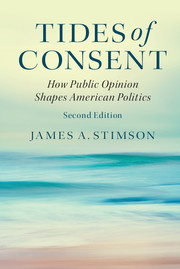Book contents
- Frontmatter
- Contents
- List of Figures
- List of Tables
- Preface to the Second Edition
- Preface to the First Edition: The Shutdown
- Acknowledgments
- 1 Opinion Flows
- 2 What the Public Wants of Government
- 3 Left and Right Movements in Preference
- 4 The Great Horse Race: Finding Meaning in Presidential Campaigns
- 5 Between the Campaigns: Public Approval and Disapproval of Government
- 6 On Politics at the Margin
- Bibliography
- Index
Preface to the First Edition: The Shutdown
Published online by Cambridge University Press: 05 September 2015
- Frontmatter
- Contents
- List of Figures
- List of Tables
- Preface to the Second Edition
- Preface to the First Edition: The Shutdown
- Acknowledgments
- 1 Opinion Flows
- 2 What the Public Wants of Government
- 3 Left and Right Movements in Preference
- 4 The Great Horse Race: Finding Meaning in Presidential Campaigns
- 5 Between the Campaigns: Public Approval and Disapproval of Government
- 6 On Politics at the Margin
- Bibliography
- Index
Summary
Bill Clinton was repudiated. The 1994 congressional elections, a triumph for the Republicans and their Contract with America, left newly elevated House Speaker Newt Gingrich in charge, proclaiming the president of the United States “irrelevant.” What ensued, in two stages, was a rare attempt at congressional government, at setting the public agenda from Capitol Hill. The first stage was the Contract, a series of carefully staged votes in the first 100 days of the new Congress. Nine of ten items passed, some surprisingly easily, although the Republican Senate, less enthusiastic by far, was slow to follow up, and Bill Clinton stood ready to veto most of what did get Senate approval.
The second stage, unlike the first, was not raised for public debate during the elections. It was an attempt to fundamentally alter the shape of the federal budget. With the enthusiasm born of being newly in control, Gingrich and the Republicans set out to achieve the goal that had always eluded Republicans, had eluded even Ronald Reagan: to actually cut down on the scale of government in the domestic sphere. They would pass a budget that would zero out spending programs (for example, the Corporation for Public Broadcasting) and would actually reduce spending across the board for healthcare, education, environment, and welfare. Cutting welfare was popular and had always been. But when Gingrich opined that orphanages weren't such a bad way to deal with dependent children, the public was reminded that even welfare cuts might not be costless.
But for this crucial second stage there was a problem: the president was not in fact irrelevant. No spending bill could become law without his signature or a two-thirds vote to override his veto. He predictably would not sign. And the bills, as if stamped “Made by the Republican Party, ”had no chance of achieving the Democratic votes that would be required for override. The well-worn path for such deadlocks is compromise. When either side can block but neither can pass its preferences into law, meeting somewhere close to the middle is the winning solution that emerges. But the election had been billed a “Republican Revolution,” and its winners, believing the wind of public support was at their backs, were thinking like revolutionaries.
- Type
- Chapter
- Information
- Tides of ConsentHow Public Opinion Shapes American Politics, pp. xv - xxivPublisher: Cambridge University PressPrint publication year: 2015



